Introduction & Drive Details
Kingston's KC3000 has demonstrated itself to be a standout performer in a sea of Phison E18 controlled SSDs with Micron 176 Layer B47R Fortis grade flash. So far, we've reviewed the KC3000 1TB and the KC3000 2TB. Both capacity points clearly showed why Kingston is the world's leading fabless memory retailer. The KC3000, even though it sports the same E18 controller and Micron B47R Fortis grade flash as countless others, it's different and more powerful than the rest.
So, what makes Kingston's KC3000 different than the plethora of similarly configured competitor SSDs? Kingston's Phison E18 powered SSDs are the only kind that aren't just relabeled generic SSDs built by Phison. Kingston builds its own SSDs. They buy flash at the wafer level and package it themselves. This allows Kingston to do things that the competition cannot. In the case of the KC3000, Kingston has enabled faster flash speeds. While the competition is arrayed with 1,200 MT B47R Fortis grade flash, Kingston has enabled its packaged in-house B47R Fortis grade flash to run 25% faster at 1,600 MT. This is the primary reason the KC3000 and its sibling, the Fury Renegade, are the best performing Phison E18 offerings available. Add to that Kingston's unique ability to customize firmware, and you get results like this:
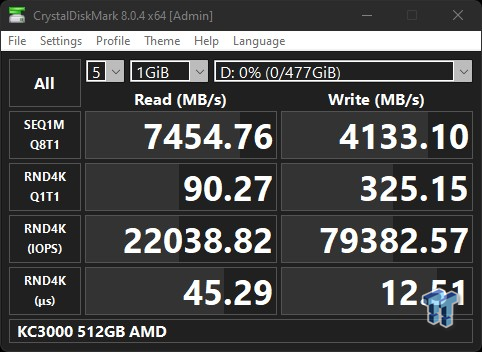
7,455 MB/s throughput is outstanding and a bit higher than other 512GB competitor offerings, but that's not where Kingston's magic is made. The magic is made on the random read front, or where performance matters most. See that 90.27 MB/s? It's roughly 3% better than we get from similarly configured SSDs arrayed with 1,200 MT B47R Fortis grade flash. 3% faster at QD1 may not sound like a lot, but it's enough to make Kingston's Phison E18 offerings stand out from the rest; sometimes by a little, sometimes by a lot.
The drive we have on our test bench today, the KC3000 512GB, like its higher capacity siblings, is a cut above the rest in terms of performance, but you also get more in the way of capacity. Similarly configured competitor SSDs are 500GB unformatted, the KC3000 is 512GB unformatted. Full capacity is something we like. Additionally, we should mention the KC3000 is the only E18 controlled SSD we know of with a dynamic cache. Dynamic cache means the amount of SLC programmed space available is adjustable on-the-fly rather than being a fixed amount. In short, Kingston's KC3000 is a unique beast even though its hardware is technically the same as many others.
Drive Details
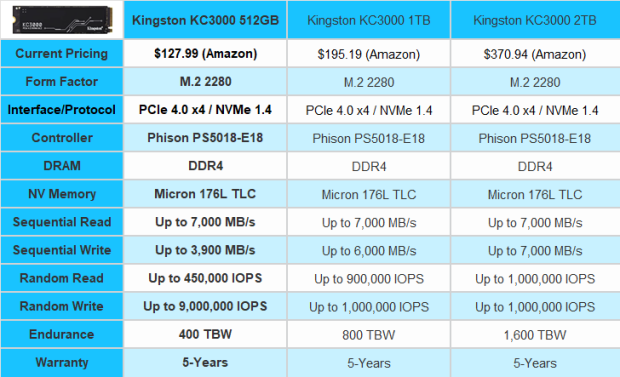
Now there is, of course, a tradeoff if you want the best. The KC3000 is typically a bit more expensive than the competition and typically carries a lower TBW rating. We are fine with both, especially the lower TBW, as it's still more than enough for 99.99% of consumers.
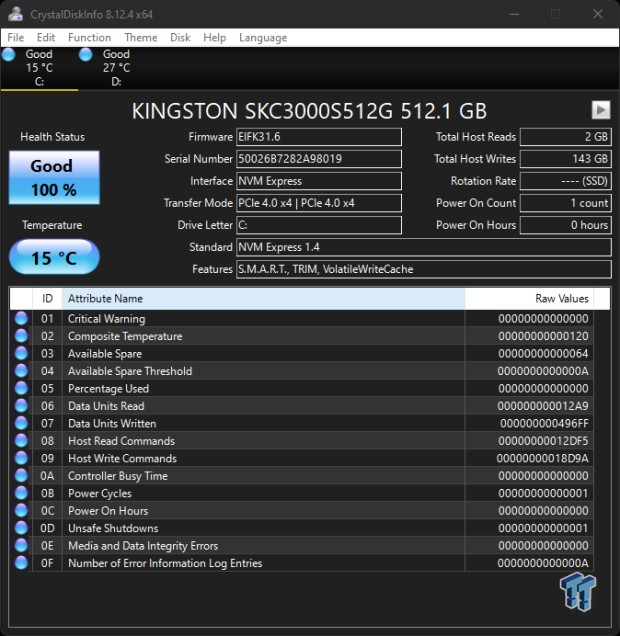
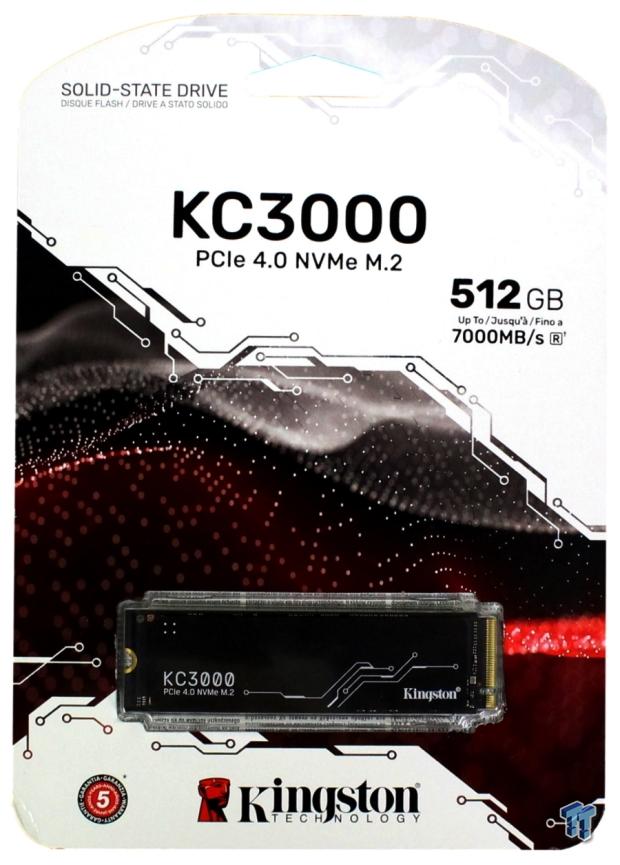
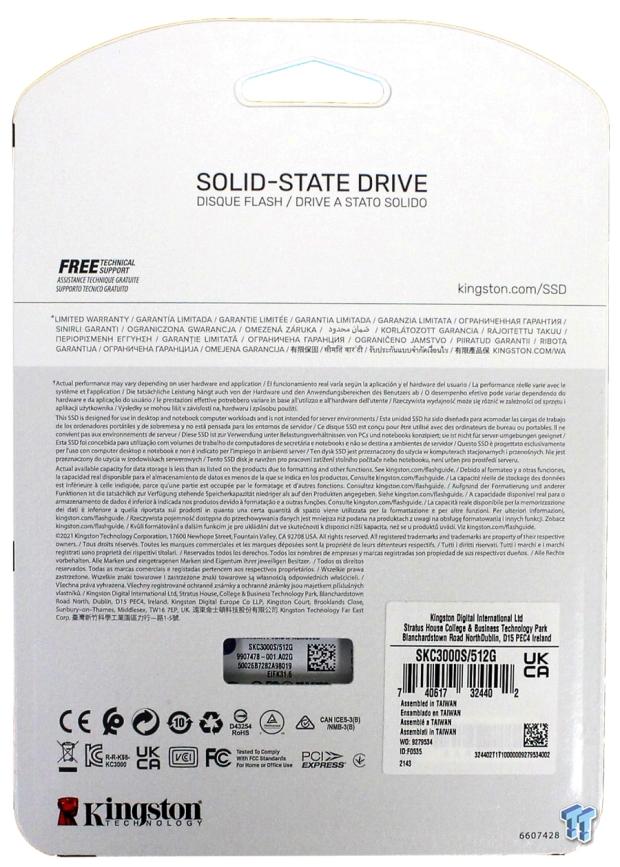


The KC3000 comes pre-fitted with a rather effective graphene-coated aluminum thermal label. It's more effective than most other variants out there because it's thicker than others we've seen.
Kingston provides a key for Acronis True Image HD for cloning over your old data, and the company's website has an SSD toolbox for download. Click the link to download Kingston's SSD Manager.
Jon's Test System Specifications
- Motherboard: ASUS ROG Z690 HERO
- CPU: Intel Core i9-12900K
- Cooler: Alphacool Eissturm Hurricane Copper 45 - Buy from Amazon
- RAM: TeamGroup T-Force Delta DDR5 6400MHz 32GB - Buy from Amazon
- Video Card: Zotac 2080Ti AMP Edition - Buy from Amazon
- Case: PrimoChill's Praxis Wetbench - Buy from Amazon
- Power Supply: Thermaltake Toughpower GF1 1000W 80+ Gold - Buy from Amazon
- OS: Microsoft Windows 11 Pro 64-bit - Buy from Amazon
- Console: Sony PlayStation 5 - Buy from Amazon
- Console Heatsink: Sabrent Heatsink for PS5 Console - Buy from Amazon

Sony PlayStation 5 - M.2 Storage Expansion
PS5 Read Performance
With Sony's wildly popular PlayStation 5 console now enabled for M.2 NVMe SSDs to be used as fast storage expansion, we include results for PS5 compatible SSDs we test as a part of our reviews going forward. We are utilizing the newest PS5 hardware and software versions.


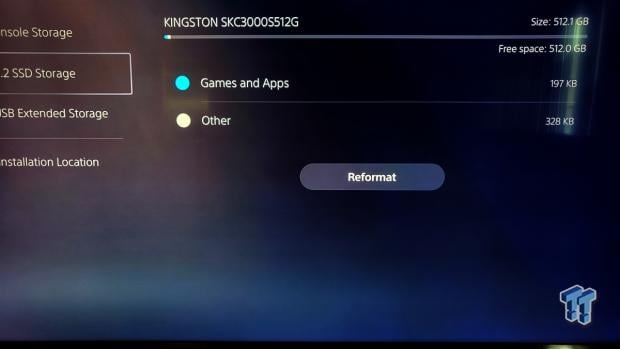

We only chart SSDs that can deliver a minimum of 5,500 MB/s read, which is Sony's original recommendation. We note that with the latest PS5 software update, even SSDs that only do 4,200 MB/s no longer trigger a low-performance warning; nevertheless, we are sticking by Sony's original recommendation of 5,500 MB/s minimum read requirement.
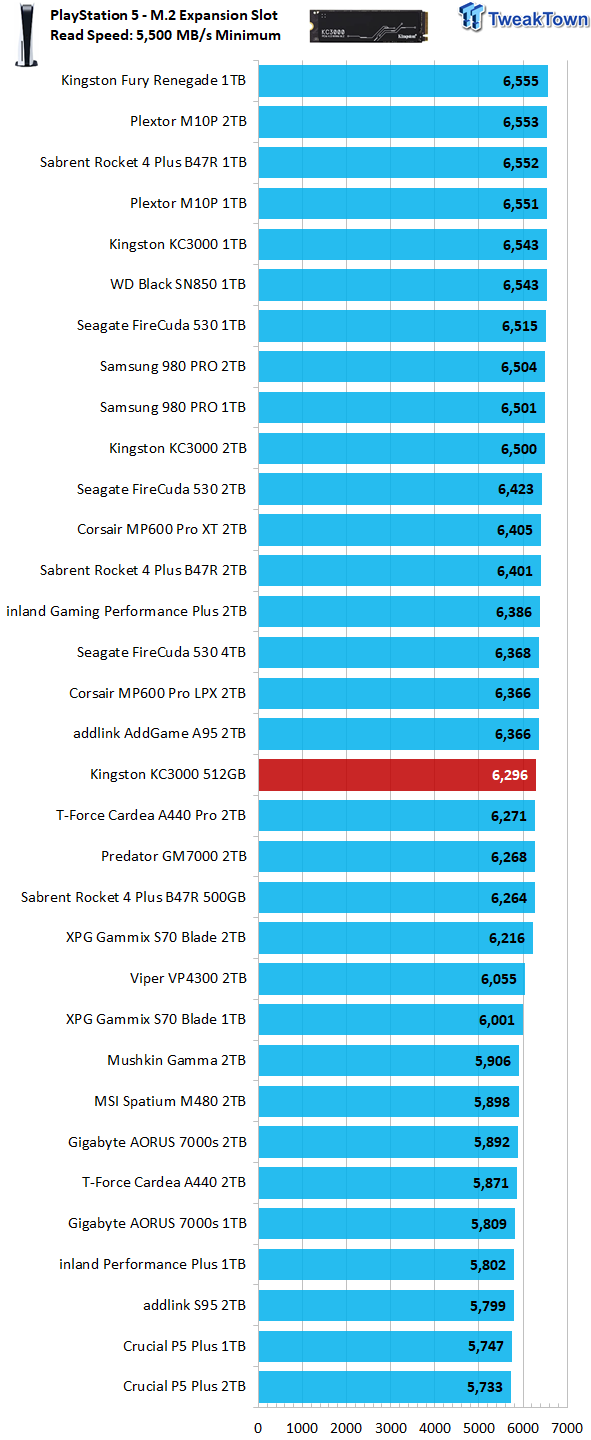
As our chart clearly shows, even at 512GB, Kingston's KC3000 is one of the better choices for your PS5's storage expansion slot. Impressive.
Synthetic Benchmarks: CDM, Anvil, ATTO
CrystalDiskMark
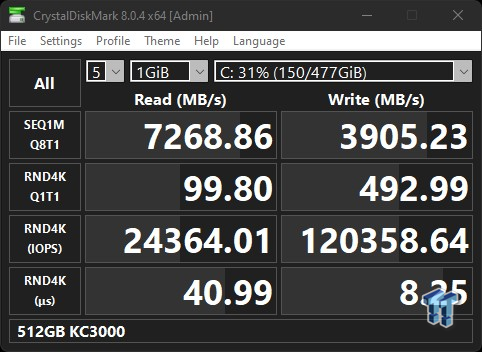

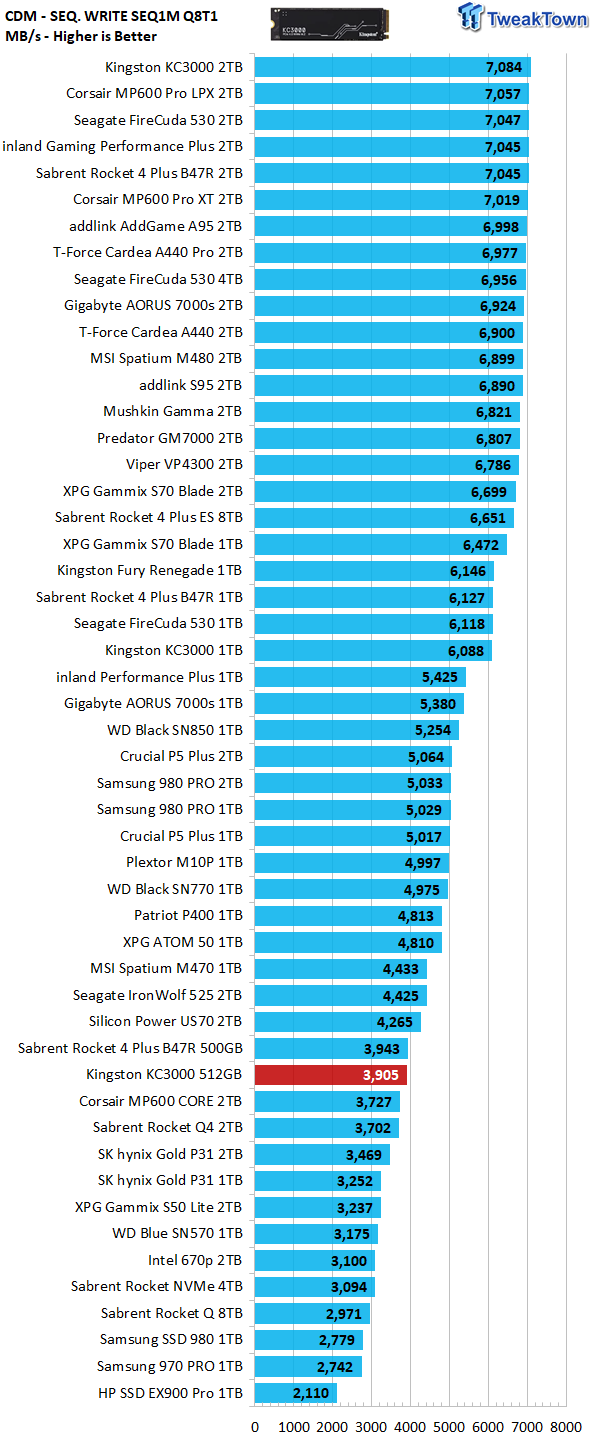
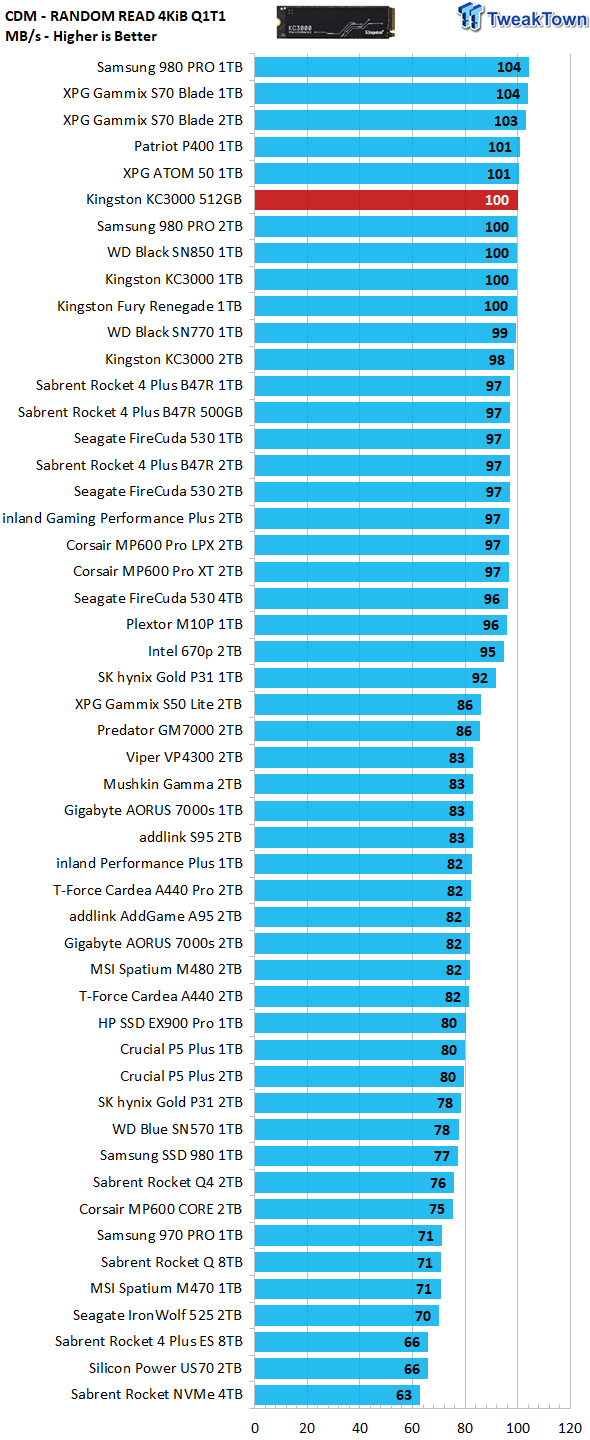
Despite its smaller capacity handicap, our 512GB KC3000 manages to tie for the all-time best sequential read and QD1 random read performances ever recorded for a Phison E18 controlled SSD. Note how the 512GB KC3000 outperforms the similarly configured 500GB Rocket 4 Plus and does so where it matters most, serving data back to the host. It costs more, but you get what you pay for.
Sequential write speeds are much lower than the higher capacity models. Still, we couldn't care less as that is a performance metric of no real consequence related to real-world performance or, as we call it, user experience. We only even bother charting sequential write speeds to confirm stated factory specs. Otherwise, we would eliminate it entirely.
Anvil's Storage Utilities
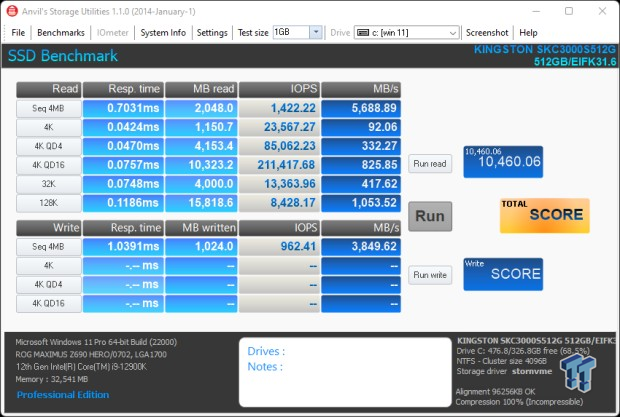
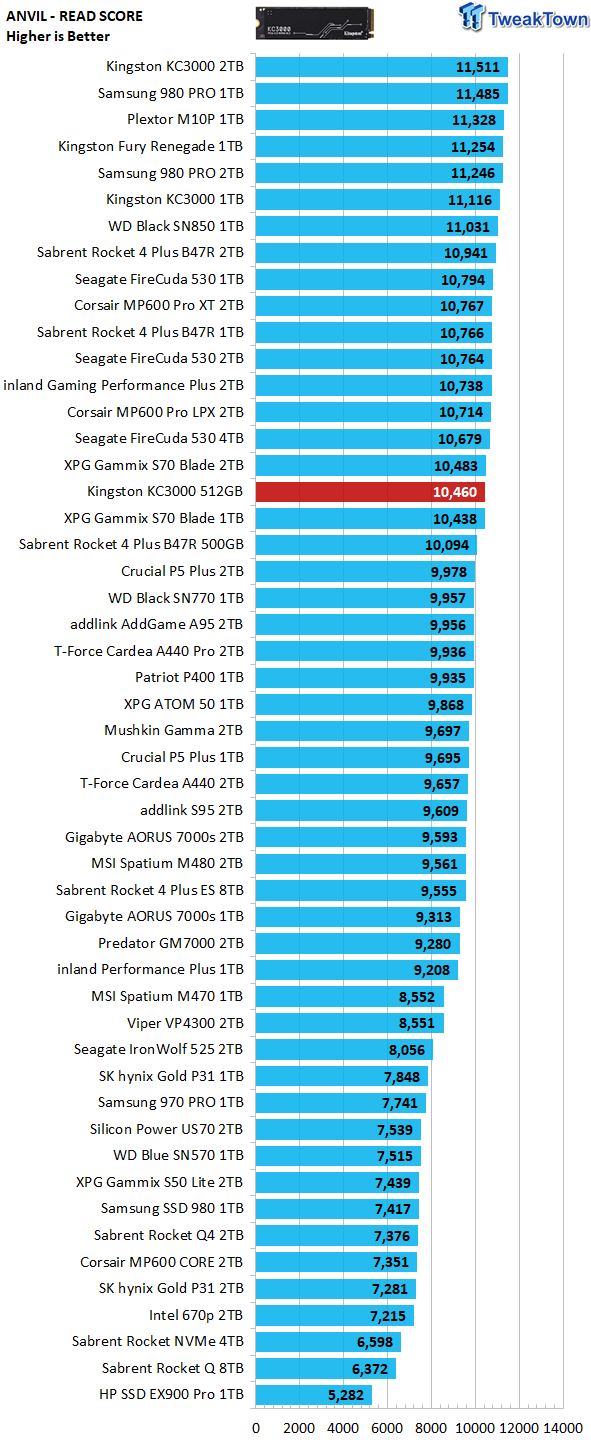
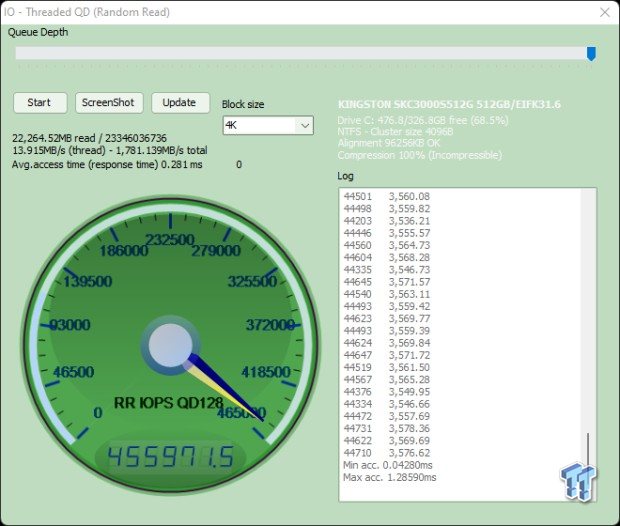
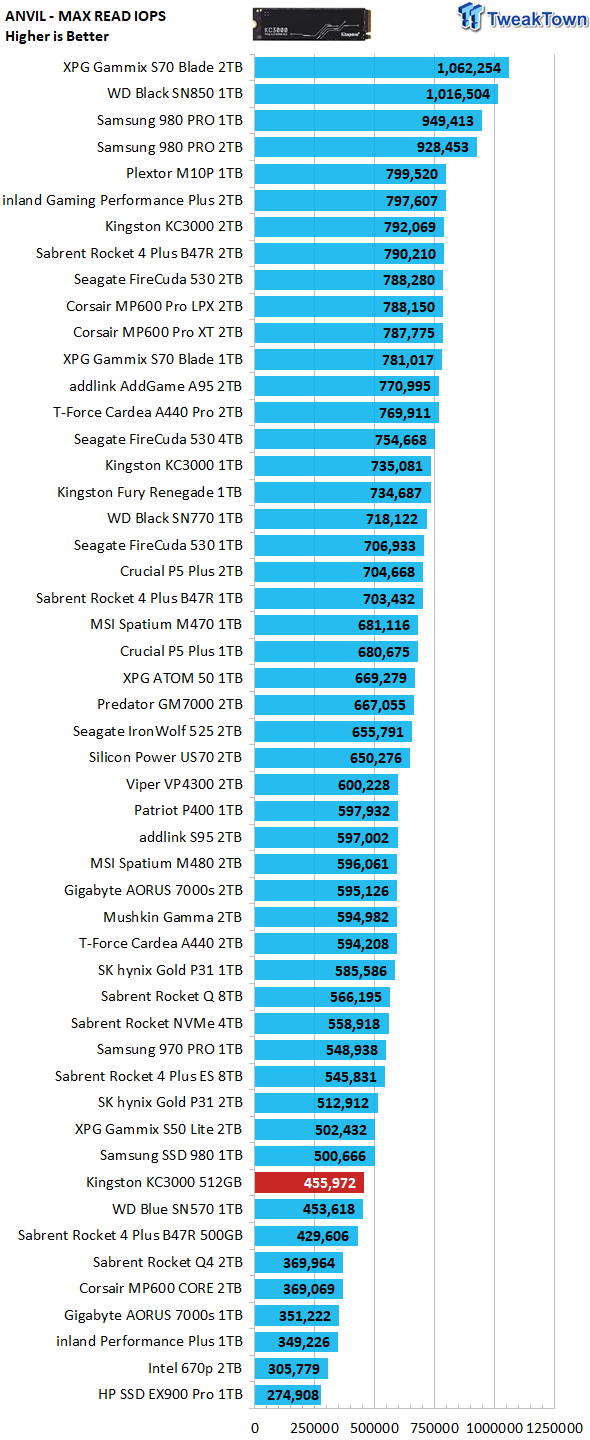
At 512GB, our small-cap KC3000 cannot generate the peak random read IOPS that its larger siblings can. Nevertheless, it still manages to punch above its weight, so to speak, because it produces incredible results at lower queue depths or where performance matters most. Outstanding.
ATTO

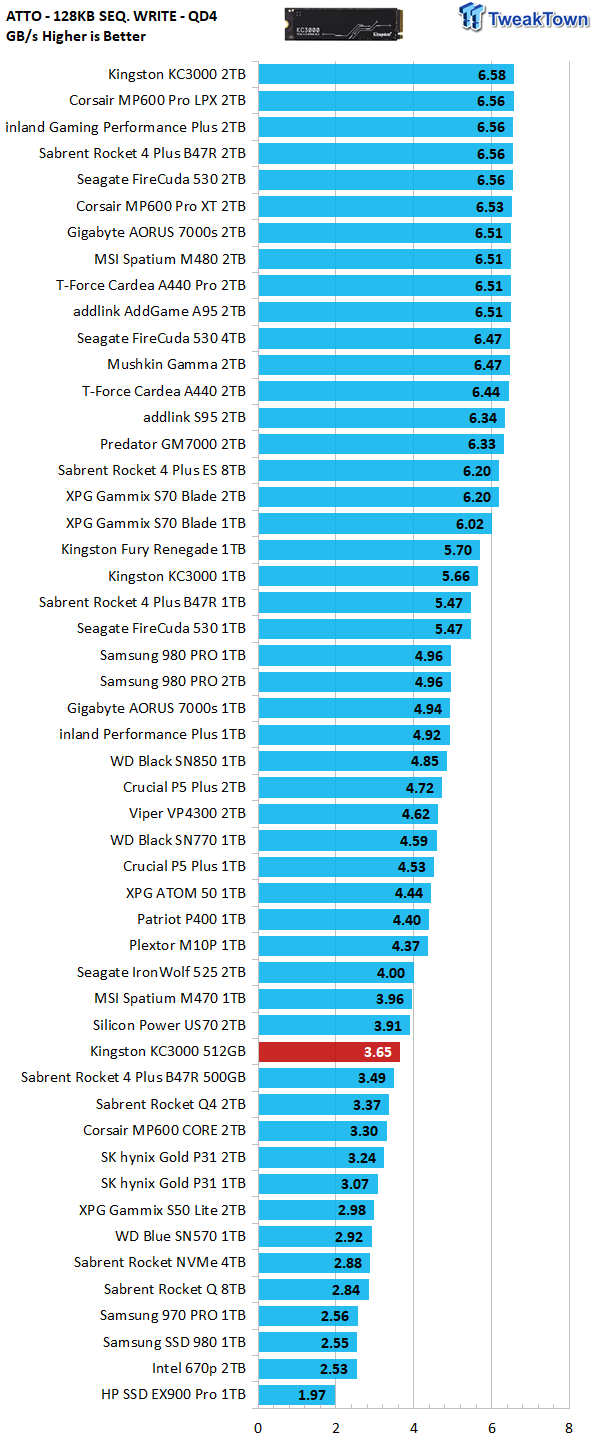

As we've stated before, sequential speeds have very little bearing on how fast an SSD is. We just run ATTO to see how a drive performs sequentially at different transfer sizes. We chart only 128K performance. Here, the KC3000 512GB has no advantage over similarly configured SSDs.
Real-World Testing: Transfers, 3DMark SSD Gaming Test, PCM10 Storage
Transfer Rates
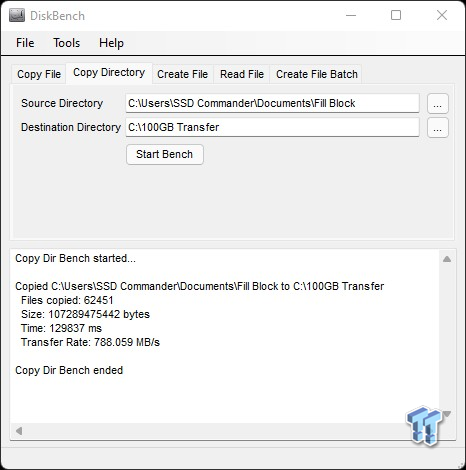
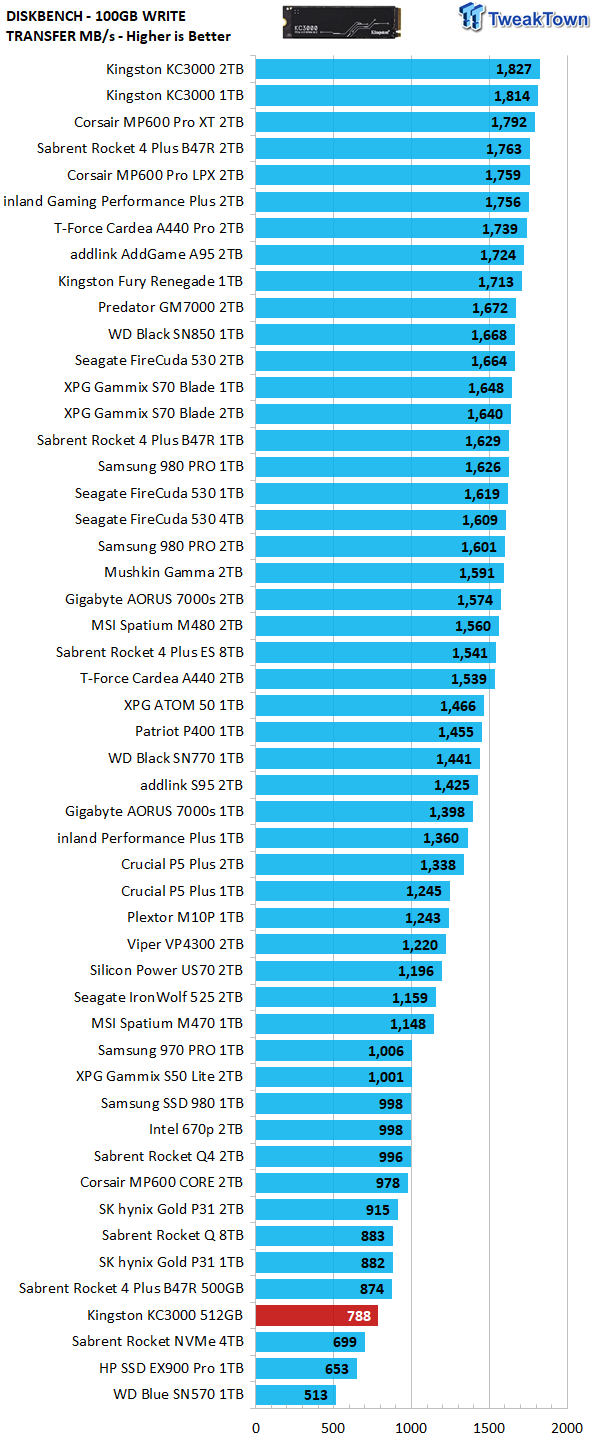
Here we see our 512GB test subject perform at a slower rate than the 500GB Sabrent Rocket 4 Plus. We don't see this as an issue as we place very little importance on programming speeds. Why? Consumer usage patterns are mostly read. How many times do you install a game? Now, how many times do you play that game?
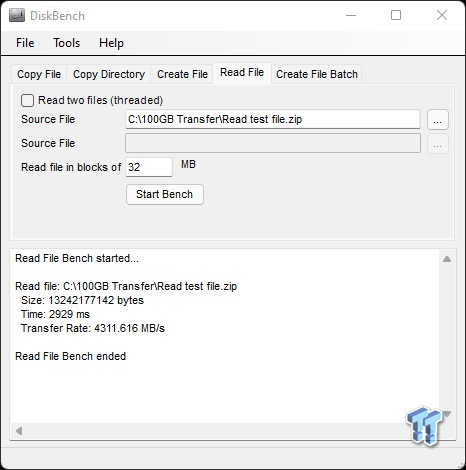
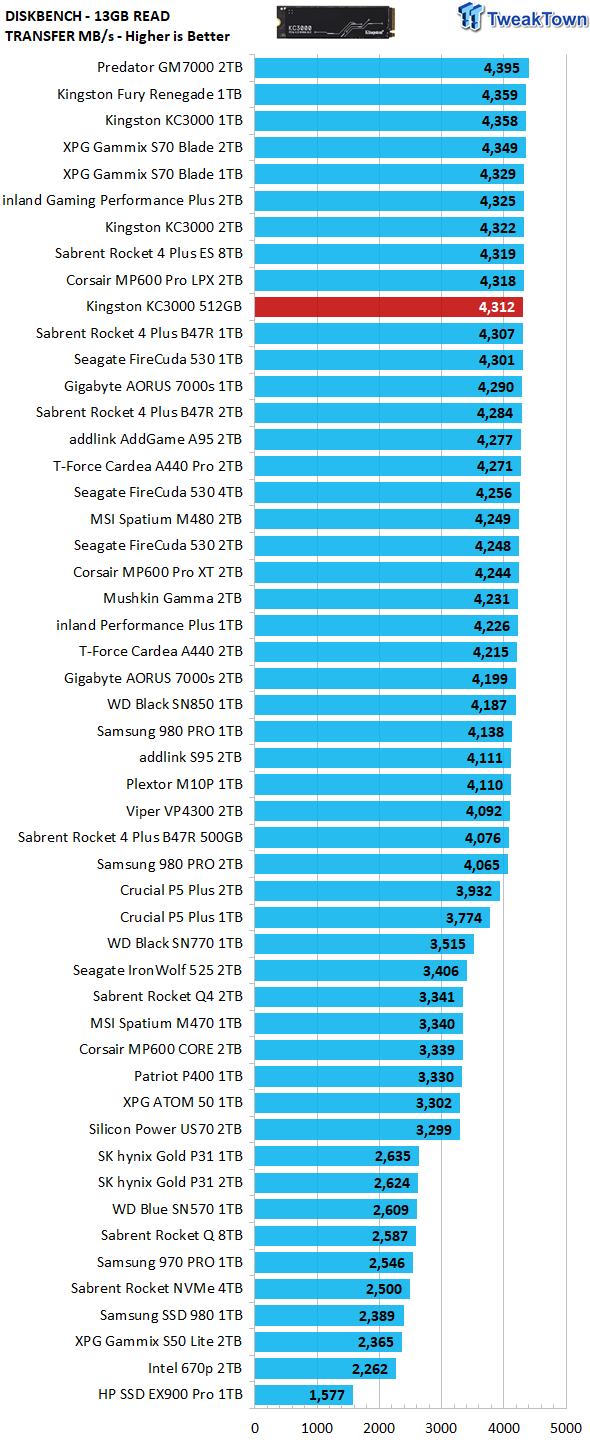
Serving data to the host is, as always, an important performance metric as it relates to user experience. Here we can see exactly what Kingston's in-house enhancements bring to the table. Our diminutive test subject can run with the big guys. In fact, it can beat most of them. Real performance that matters.
3DMark SSD Gaming Test
UL's newest 3DMark SSD Gaming Test is the most comprehensive SSD gaming test ever devised. We consider it superior to testing against games themselves because, as a trace, it is much more consistent than variations that will occur between runs on the actual game itself. This test is in fact the same as running the actual game, just without the inconsistencies inherent to application testing.
In short, we believe that this is the world's best way to test an SSDs gaming prowess and accurately compare it against competing SSDs. The 3DMark SSD Gaming Test measures and scores the following:
- Loading Battlefield V from launch to the main menu.
- Loading Call of Duty Black Ops 4 from launch to the main menu.
- Loading Overwatch from launch to the main menu.
- Recording a 1080p gameplay video at 60 FPS with OBS (Open Broadcaster Software) while playing Overwatch.
- Installing The Outer Worlds from the Epic Games Launcher.
- Saving game progress in The Outer Worlds.
- Copying the Steam folder for Counter-Strike Global Offensive from an external SSD to the system drive.
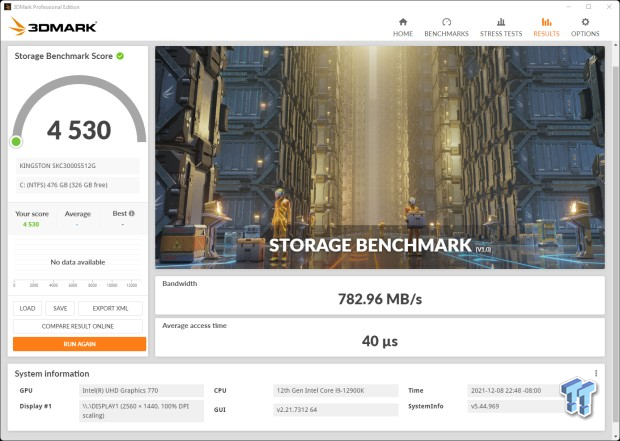
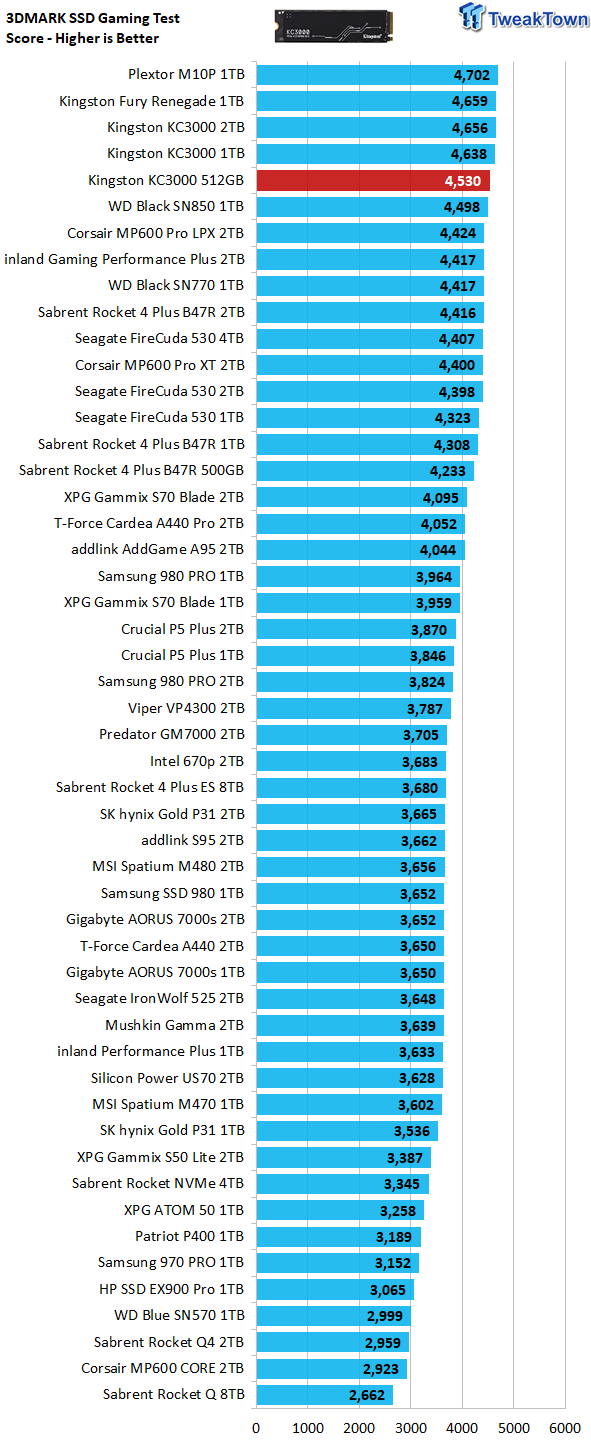
Gaming is a performance metric that matters to the majority of DIY consumers, especially to the enthusiast crowd that TweakTown caters to. Look at that, would you? The 512GB KC3000 is an absolute beast and, as we see it, worth every penny of the premium it commands. Despite its capacity handicap, it puts forth the fifth-best gaming result to date for a flash-based SSD. Only one SSD (not even available in the Americas) outside of its Kingston brethren can best it here. Savage AF.
PCM10 Storage Tests
PCMark 10 Storage Test is the most advanced and most accurate real-world consumer storage test ever made. There are four different tests you can choose from; we run two of them.
The Full System Drive Benchmark and the Quick System Drive Benchmark. The Full System Drive Benchmark writes 204 GB of data over the duration of the test. The Quick System Drive Benchmark writes 23 GB of data over the duration of the test. These tests directly correlate with mainstream user experience.
PCMark 10 Full System Drive Benchmark
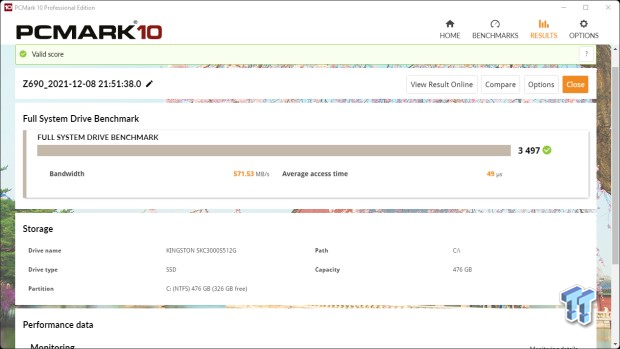
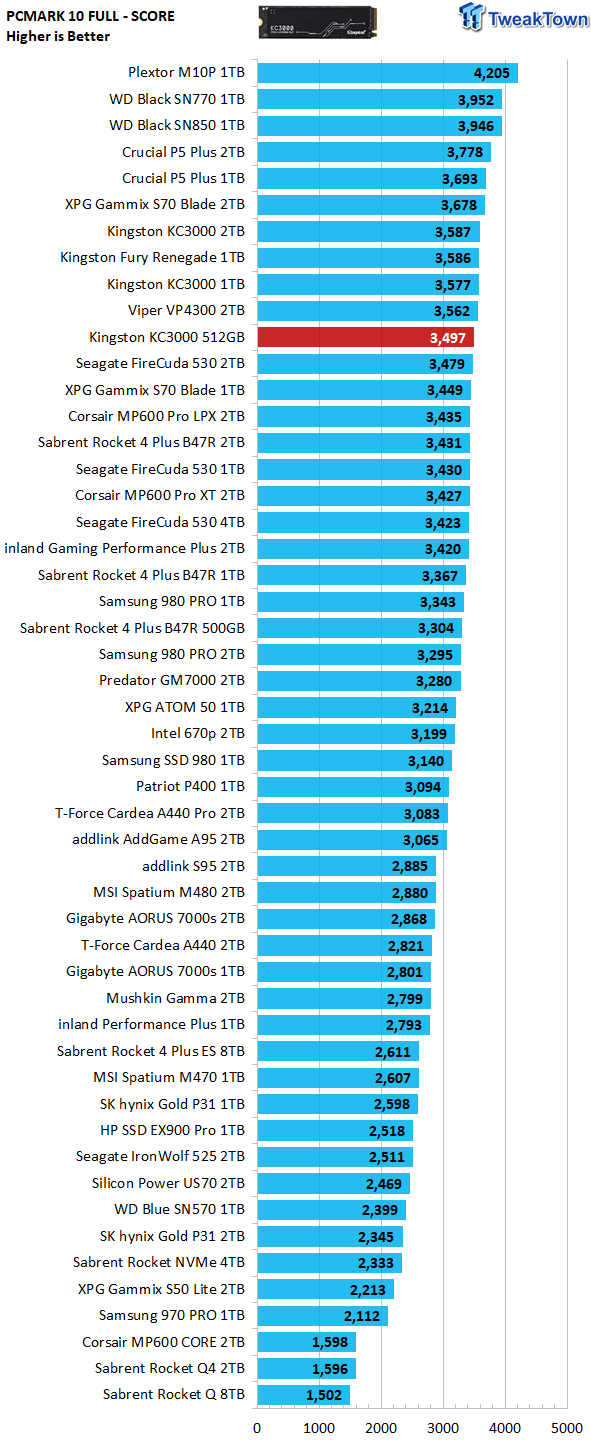
This particular test writes 204GB data and covers a broad range of common consumer tasks, including booting Windows 10, file transfers, Adobe and Office applications, and startup times for games including Battlefield V, COD Black Ops 4, and Overwatch. Unlike synthetic numbers, this is comprehensive real-world data which is why we use it to rank SSDs in terms of user experience.
This test again demonstrates just how much of a non-factor sequential write throughput is in the consumer realm. As you can clearly see, our 512GB KC3000 performs better in the real world than competing E18 controlled SSDs that can crank out more than 7,000 MB/s sequential write throughput. Despite this test writing (programming) a massive 204GB data, our 512GB test subject performs incredibly well. Why? Most consumer data is random, not sequential.
PCMark 10 Quick System Drive Benchmark

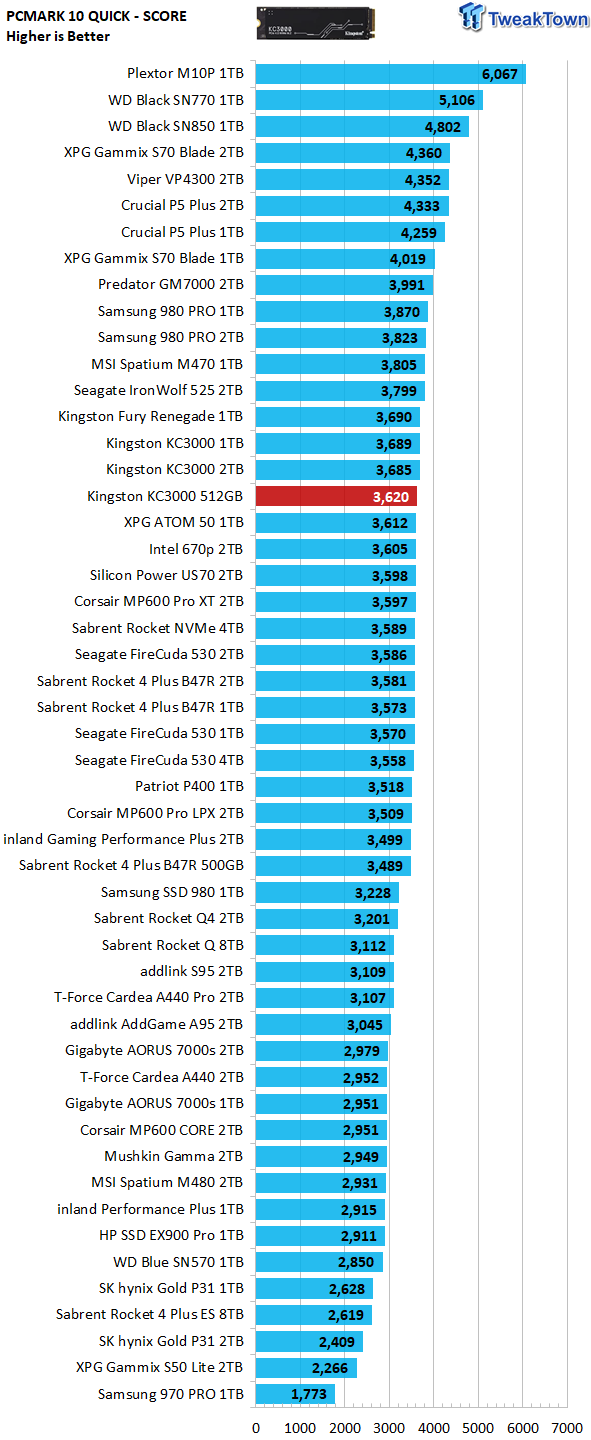
Again, Kingston's 512GB KC3000 shows it is built to run with the best as it outruns all non-Kingston Phison E18 based SSDs. Wow.
Final Thoughts
Kingston's KC3000 512GB, other than Optane, represents the first time we can recall. Size doesn't matter. For the most part, the 512GB KC3000 is just as fast as its higher capacity siblings, and we are talking where it matters, not meaningless sequential speeds. How fast is that? It's faster at gaming, and consumer workloads than any non-Kingston Phison E18 controlled SSD we've tested to date. Being this fast at 512GB is almost unheard of. Kudos to you, Kingston.
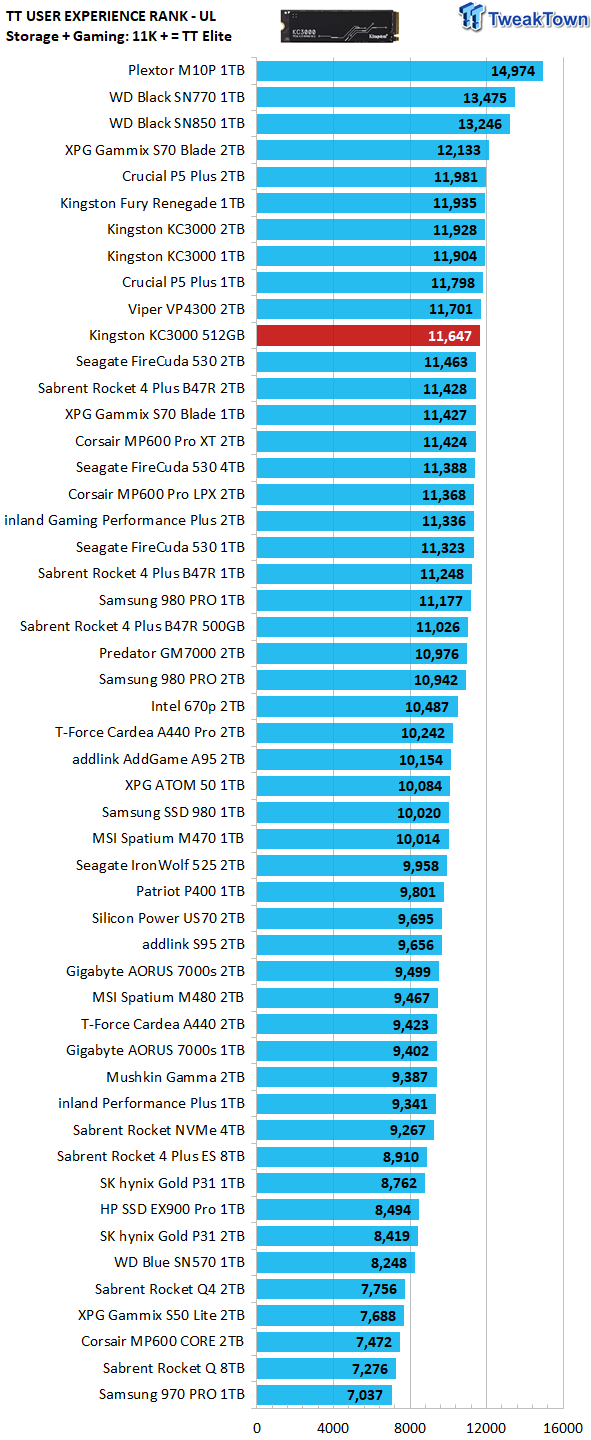
We rank SSDs in terms of overall user experience (performance where it matters most) as expressed by PCMark 10 storage and 3DMark gaming storage tests. We consider a user experience score of 11K or more to verify an SSD as a TweakTown Elite performer.
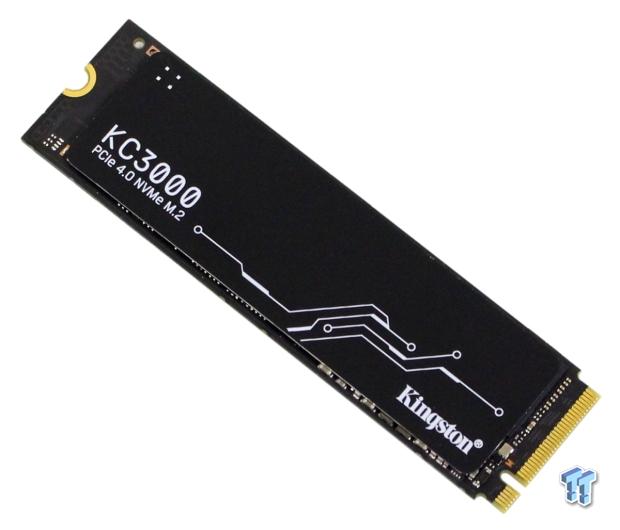
Kingston's 512GB KC3000 shows us that size doesn't always matter as it joins its siblings as a certified TweakTown Elite performer and, in the process, earns our highest award.
Pros
- Gaming
- User Experience
- Read Performance
Cons
- None

Performance |
99% |
Quality |
100% |
Features |
98% |
Value |
95% |
Overall |
98% |
The fastest 512GB SSD we've ever tested.

What's in Jon's PC?
- CPU: AMD Ryzen 7800X 3D
- MOTHERBOARD: GIGABYTE AORUS Master X670E
- RAM: Kingston Fury Renegade 7200MHz 32GB
- GPU: ZOTAC AMP Extreme GeForce RTX 4090
- SSD: Crucial T700 2TB Gen5
- OS: Windows 11 Pro
- COOLER: Lian Li Galahad 360 AIO
- CASE: Lian Li Lancool III
- KEYBOARD: Corsair K65 RGB Mini
- MOUSE: SteelSeries AEROX 5 Wireless
- MONITOR: ASUS ROG Strix PG27AQN 360Hz 1440p ULMB2
Similar Content
Related Tags

